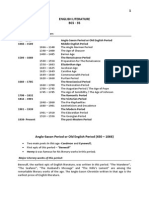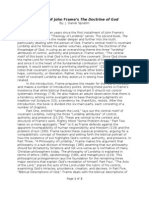John Dryden (1631-1700) : Annus Mirabilis Absalom and Achitophel
John Dryden (1631-1700) : Annus Mirabilis Absalom and Achitophel
Uploaded by
Dfdf DfdfdfCopyright:
Available Formats
John Dryden (1631-1700) : Annus Mirabilis Absalom and Achitophel
John Dryden (1631-1700) : Annus Mirabilis Absalom and Achitophel
Uploaded by
Dfdf DfdfdfOriginal Title
Copyright
Available Formats
Share this document
Did you find this document useful?
Is this content inappropriate?
Copyright:
Available Formats
John Dryden (1631-1700) : Annus Mirabilis Absalom and Achitophel
John Dryden (1631-1700) : Annus Mirabilis Absalom and Achitophel
Uploaded by
Dfdf DfdfdfCopyright:
Available Formats
John Dryden (1631-1700)
John Dryden, an English poet and dramatist, was born on August 19, 1631, in Aldwinkle, Northamptonshire, England. Hereceived a classical education at Westminster School and Trinity College, Cambridge,and then moved to London in 1657 to begin his career as a professional writer. Both his first offering, Tyrannick Love (1669), and The Conquest ofGranada by the Spaniards (1670), are examples of heroic tragedy Dryden turned his hand to comedyand produced Marriage A-la-Mode, a brilliant battle of the sexes. Dryden turned to poetry and solidified his reputation as the leadingwriter of the day with such masterpieces as Absalom and Achitophel. He also adapted a number of Shakespeares plays including TheTempest and All for Love (1677). In addition, he wrote the libretto for several operas.John Dryden died in London on May 12, 1700, and was buried in Westminster Abbeynext to Chaucer. .Perhaps no nation ever produced a writer that enriched hislanguage with such a variety of models.(Samuel Johnson)
he married Lady Elizabeth Howard. As a writer of Comedies he was successful, but his heroic tragedies were more important
Father of English Criticism First taught to determine upon principles the merit of composition Others before him only presented occasional views The year 1666 was eventful in English history, including both the naval war with the Dutch, and the Great Fire of London. Dryden commemorated this 'year of wonders" in his long poem, Annus Mirabilis, in 1667. This poem secured him the position of Poet Laureate on the death of William D'Avenant in 1668. Absalom and Achitophel, appeared in 1681. It is one of the great English satires, and it brought him further favor with Charles II, who was pleased at this attack against the Whigs during the Exclusion Crisis Dryden also had a keen interest in theology, and this resulted first in the publication of Religio Laici (1682). This work, the title of which translates as "A Layman's Faith", was a long religious poem arguing Christianity over Deism, the Bible as the guide to salvation, and the Anglican Church over the Catholic Church Gave importance to classical rules Rules Compatibility with nature New interpretation of rules based on the nature of poetry
In 1668, Dryden began a fruitful period of both critical and dramatic writing. His first major critical work was the Essay of Dramatic Poesy (1668) "A Song for Saint Cecilia's Day" He also wrote more poetry, including "An Ode ode for St. Cecilia's Day, "Alexander's Feast" (1697), which was later incorporated into his Fables Ancient and Modern (1700), paraphrases of Ovid, Boccaccio, and Chaucer. Dryden died on April 30, 1700, soon after the publication of the Fables, of inflammation caused by gout. He was buried in Westminster Abbey. Dryden was a good playwright and poet, a fine translator, a solid critic, and an excellent satirist whose works are still worthy of much admiration.
England had great writers before Dryden but not great critics Touched upon wide range of issues concerning literature of his time
`Mr. Dryden ... my departed friend, whom I infinitely esteemed when living for the solidity of his thought, for the spring, the warmth, and the beautiful turn of it; for the Power and variety, and fullness of his harmony; for the purity, the perspecuity, the energy of his expression; and (whenever the following great qualities are required) for the pomp and solemnity, and majesty of his Style.'John Dennis.
You might also like
- A Brief History of English Literature NotesDocument15 pagesA Brief History of English Literature NotesThe CSS Point80% (46)
- The Way by Fr. George MetallinosDocument137 pagesThe Way by Fr. George Metallinosdelef375% (4)
- BAPTISM: A Primer For Ordinary FolksDocument26 pagesBAPTISM: A Primer For Ordinary FolksMcKay Caston100% (2)
- Pre-Shakespearean Drama - FinalDocument46 pagesPre-Shakespearean Drama - FinalSanda Mehulic67% (3)
- Kind NeighhboursDocument209 pagesKind NeighhboursAlbertoPita100% (2)
- DrydenDocument5 pagesDrydensushila khileryNo ratings yet
- John DrydenDocument2 pagesJohn Drydenarti2011No ratings yet
- John DrydenDocument1 pageJohn DrydenDoinița LeonNo ratings yet
- Uuniversity of Sindh JamshoroDocument6 pagesUuniversity of Sindh JamshoroMr AlphaNo ratings yet
- John Dryden - MergedDocument27 pagesJohn Dryden - Mergedadnaraquel98No ratings yet
- John Dryden: Literary Critic Poet LaureateDocument6 pagesJohn Dryden: Literary Critic Poet LaureateSilver SethiNo ratings yet
- 10.1 The Pre RomanticismDocument7 pages10.1 The Pre Romanticismishan sarkarNo ratings yet
- Short Notes John DrydenDocument1 pageShort Notes John Drydenadhikarirai960No ratings yet
- John DrydenDocument8 pagesJohn DrydenMUHAMMAD SHAHIDNo ratings yet
- John DrydenDocument4 pagesJohn DrydenfghNo ratings yet
- John DrydenDocument4 pagesJohn DrydenKanwal KhalidNo ratings yet
- John DrydenDocument4 pagesJohn DrydenAsheesh MishraNo ratings yet
- Paper 2notesDocument12 pagesPaper 2notesArt ishkNo ratings yet
- Age of DrydenDocument6 pagesAge of DrydenDhivyaNo ratings yet
- Minor Poets of The Restoration PeriodDocument19 pagesMinor Poets of The Restoration Periodnadieh_baderkhani100% (3)
- المستندDocument10 pagesالمستندMahmoud Mustafa Yahya MohammedNo ratings yet
- Age of DrydenDocument9 pagesAge of DrydenSourabh AgarwalNo ratings yet
- Restorition Period of John DrydenDocument3 pagesRestorition Period of John DrydenAnas AliNo ratings yet
- Arcadia Study GuideDocument6 pagesArcadia Study GuideAnnabellaSchmokerNo ratings yet
- All for Love: "Between what matters and what seems to matter, how should the world we know judge wisely?"From EverandAll for Love: "Between what matters and what seems to matter, how should the world we know judge wisely?"No ratings yet
- 7 John DrydenDocument40 pages7 John DrydenChirbat Raja SameNo ratings yet
- Restoration Drama and ProseDocument2 pagesRestoration Drama and Prosescarlett811100% (1)
- A Brief History of English LiteratureDocument9 pagesA Brief History of English LiteratureJavedkhan PathanNo ratings yet
- John DrydenDocument2 pagesJohn DrydenTahir LodhiNo ratings yet
- Unit 2 Poetry Summary - 1717202543569186Document18 pagesUnit 2 Poetry Summary - 1717202543569186amandeepkahlon98No ratings yet
- Notes DSC 5 Unit 2Document14 pagesNotes DSC 5 Unit 2M Pavan kumarNo ratings yet
- From Wikipedia, : Dryden Was An Essayist, Translator, Critic, Sharp Satirist and PoetDocument12 pagesFrom Wikipedia, : Dryden Was An Essayist, Translator, Critic, Sharp Satirist and Poetواحة التسليةNo ratings yet
- History of Eng LiteratureDocument38 pagesHistory of Eng Literaturezeeshan.rafique333No ratings yet
- Discourses On Satire & Epic Poetry: “We first make our habits, then our habits make us.”From EverandDiscourses On Satire & Epic Poetry: “We first make our habits, then our habits make us.”No ratings yet
- 21stPWLiterature - English LiteratureDocument5 pages21stPWLiterature - English LiteraturebadrodenashimaNo ratings yet
- English Literature BCS-35 PDFDocument19 pagesEnglish Literature BCS-35 PDFTuhin Azad91% (11)
- The Development of English Literature (Summary)Document4 pagesThe Development of English Literature (Summary)Geetanjali JoshiNo ratings yet
- 21st Century Literature - 2nd Quarter - HandoutDocument16 pages21st Century Literature - 2nd Quarter - HandoutLabelleee RodrigoNo ratings yet
- 341 The Renaissance PeriodDocument37 pages341 The Renaissance Periodjanille marie100% (2)
- Renaissance English LiteratureDocument8 pagesRenaissance English LiteratureStarciuc SvetlanaNo ratings yet
- Augustan LiteratureDocument2 pagesAugustan LiteraturetonyNo ratings yet
- HIS Term Paper PDFDocument13 pagesHIS Term Paper PDFrisob khanNo ratings yet
- 3RD PART (Literary Genres)Document7 pages3RD PART (Literary Genres)GABRIEL CABANSAGNo ratings yet
- Augustan AgeDocument4 pagesAugustan AgedivinachrystynmariemNo ratings yet
- Compilation of Ten Famous Classical Writers and Their MasterpiecesDocument20 pagesCompilation of Ten Famous Classical Writers and Their MasterpiecesJose Emmanuel Sarumay ManingasNo ratings yet
- Encyclopaedia Britannica, 11th Edition, Volume 8, Slice 9 "Dyer" to "Echidna"From EverandEncyclopaedia Britannica, 11th Edition, Volume 8, Slice 9 "Dyer" to "Echidna"No ratings yet
- Literary Genres From Different TraditionsDocument7 pagesLiterary Genres From Different TraditionsGerrylyn BalanagNo ratings yet
- 21 STDocument15 pages21 STLovely Rocel RubioNo ratings yet
- Critical Presentation On Dryden Resto-ComedyDocument4 pagesCritical Presentation On Dryden Resto-Comedyshibasundar193No ratings yet
- English Speaking Countries: List of Significant Authors: 1. BeowulfDocument5 pagesEnglish Speaking Countries: List of Significant Authors: 1. BeowulfDunas SvetlanaNo ratings yet
- EL117 - Literar Y Criticis M: Reporter For The Day: Mamarinta, Yasmen P. Mancera, Mary Ann SDocument22 pagesEL117 - Literar Y Criticis M: Reporter For The Day: Mamarinta, Yasmen P. Mancera, Mary Ann SJulibel ManceraNo ratings yet
- Summary About The Literary PeriodDocument5 pagesSummary About The Literary PeriodThe_calvoNo ratings yet
- Ilovepdf MergedDocument30 pagesIlovepdf MergedMehak Ladwal 533No ratings yet
- Life and Works of Alexander PopeDocument5 pagesLife and Works of Alexander PopeAaliza AaliNo ratings yet
- DrydenDocument5 pagesDrydenNoshin AkhtarNo ratings yet
- Literary Genres. HandoutsDocument4 pagesLiterary Genres. HandoutsRovz GC BinNo ratings yet
- 09050700255822Document30 pages09050700255822hsmannNo ratings yet
- Romantic PoetryDocument13 pagesRomantic PoetrySilvanaNo ratings yet
- ASSIGNMENT ON Age of SensibilityDocument7 pagesASSIGNMENT ON Age of Sensibilityrisob khanNo ratings yet
- Age of JohnsonDocument15 pagesAge of JohnsonnkumarrsNo ratings yet
- Sir Walter ScottDocument13 pagesSir Walter Scottnadieh_baderkhaniNo ratings yet
- The Emperor's New Clothes - The Golden Age of Illustration SeriesFrom EverandThe Emperor's New Clothes - The Golden Age of Illustration SeriesNo ratings yet
- Hillsong Cornerstone Album LyricsDocument15 pagesHillsong Cornerstone Album LyricsForas FordNo ratings yet
- Book Reviews: Blackboard Black MaiDocument3 pagesBook Reviews: Blackboard Black MaiChalcedon Presbyterian ChurchNo ratings yet
- I Have Done My Part, May Christ Teach You Yours.: Franciscan Youth Leadership Seminar Is A FruitDocument3 pagesI Have Done My Part, May Christ Teach You Yours.: Franciscan Youth Leadership Seminar Is A FruitRose Lynn Anne BesaNo ratings yet
- Gailus 2002Document33 pagesGailus 2002Gabriela MontezNo ratings yet
- Greater First United Baptist Church: A Word Just For You From Pastor JohnsonDocument4 pagesGreater First United Baptist Church: A Word Just For You From Pastor JohnsonMichelle JohnsonNo ratings yet
- Introduction To Christian ApologeticsDocument26 pagesIntroduction To Christian ApologeticsJohnson C Philip100% (8)
- Pantheism: 1. MonotheismDocument2 pagesPantheism: 1. Monotheismeirad24No ratings yet
- 12 Characteristics of Parish Social MinistryDocument4 pages12 Characteristics of Parish Social MinistryCatholic Charities USA100% (1)
- Chapter Helps Yolanda Victims in Bogo: Message For The MonthDocument8 pagesChapter Helps Yolanda Victims in Bogo: Message For The MonthJun GulaNo ratings yet
- Grade 2 Religion 3rd Quarter Practice ExamDocument2 pagesGrade 2 Religion 3rd Quarter Practice ExamdenfanNo ratings yet
- Black Death Essay - C. Tran - PERIOD 3Document2 pagesBlack Death Essay - C. Tran - PERIOD 3Catherine TranNo ratings yet
- Jarnail Singh BhindranwaleDocument17 pagesJarnail Singh Bhindranwalejaspreetnarang100% (1)
- Your Eternal DestinyDocument2 pagesYour Eternal DestinyThe Fatima CenterNo ratings yet
- 4283477Document66 pages4283477teqatifNo ratings yet
- Conversations With KafkaDocument15 pagesConversations With Kafkarockyang62No ratings yet
- DLL ReligionDocument8 pagesDLL ReligionDahlia Mi Villanueva0% (1)
- 1689 London Baptist Confession of Faith - 2Document4 pages1689 London Baptist Confession of Faith - 2John Morhi Dela PazNo ratings yet
- 1953 Yearbook of Jehovahs WitnessesDocument417 pages1953 Yearbook of Jehovahs WitnessesJw Christiantj0% (1)
- Presentation 6Document7 pagesPresentation 6api-313924977No ratings yet
- Orthodox Vision of CreationDocument14 pagesOrthodox Vision of CreationMarius MunteanuNo ratings yet
- 1906 10 PDFDocument4 pages1906 10 PDFMichael HerringNo ratings yet
- The Old Man and The Sea - pdf1Document8 pagesThe Old Man and The Sea - pdf1Ali ZainNo ratings yet
- Caldwell's Manor BaptistDocument5 pagesCaldwell's Manor BaptistNancy CunninghamNo ratings yet
- Book Review - Doctrine of God by John FrameDocument3 pagesBook Review - Doctrine of God by John FrameJ. Daniel Spratlin100% (1)
- An Psalter C 00 BrowDocument264 pagesAn Psalter C 00 BrowHumphrey Ibifubara50% (2)
- The Northern Ireland Question - Simple As ABC?Document4 pagesThe Northern Ireland Question - Simple As ABC?NevinNo ratings yet

























































































